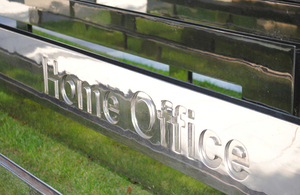CONTEST Annual Report Published
A report setting out the progress made throughout 2014 to implement the Government's counter-terrorism strategy was published today by the Home Secretary.

Home Office
It outlines the current threat to the country from terrorism and how the government is responding using the four-strand structure of Pursue, Prevent, Protect and Prepare.
While there were no successful terrorist attacks in the UK last year, the report finds that international terrorism has not only grown but also changed significantly in nature. The country’s threat level was raised for the first time since the beginning of 2010 to ‘SEVERE’, meaning an attack in the UK is highly likely. The main threat continues to be posed by militant Islamist terrorists, many of which are inextricably linked to the on-going events in Syria and Iraq.
Immigration and Security Minister James Brokenshire said:
The recent terrible events in Tunisia, Paris and Copenhagen were a tragic reminder of the great challenge we face from terrorism.
This report makes clear that while the police and security and intelligence agencies continue to do extraordinary work to disrupt these threats, we must ensure they continue to have the powers and capabilities they need.
That is why this Government has brought forward legislation to address a number of the specific challenges we are currently facing and why we have increased funding.
We must continue to adapt throughout 2015 in order to stay ahead of the threat and to protect the public.
Significant resources and capabilities have been put in place over the last year. These include:
-
Measures in the Counter Terrorism and Security Act to strengthen our powers and capabilities to tackle specific threats relating to Syria and Iraq, including providing additional means to disrupt the travel of foreign fighters to and from the region, as well as improving our ability to manage them on their return.
-
The introduction of the Data Retention and Investigatory Powers Act (DRIPA) in July 2014. The new legislation provides a legal basis on which domestic communications companies can continue to retain certain types of communications data.
-
£130m additional counter terrorism funding was announced by the Prime Minister in November. This provides funding for the security and intelligence agencies and police to increase their investigative resource; and for the expansion of the cross-Government Prevent programme to tackle the ideology that feeds supports and sanctions terrorism.
-
Measures in the CT and Security Bill will enhance aviation security by legislating on passenger information, authority to carry (‘no-fly’) lists, and security and screening measures. We have continued to fund airport security programmes in high threat areas, and to fund our own network of aviation security officers overseas.
The Government’s strategy, known as CONTEST, continues to provide a sound framework to deal with the changing threat.
The report highlights the new challenges faced including a trend of higher numbers relatively unsophisticated attacks, often carried out by lone individuals. Attacks of this nature are more difficult for law enforcement agencies to detect. In addition, changes in the technology used by terrorists are making it harder for law enforcement to maintain intercept capabilities.